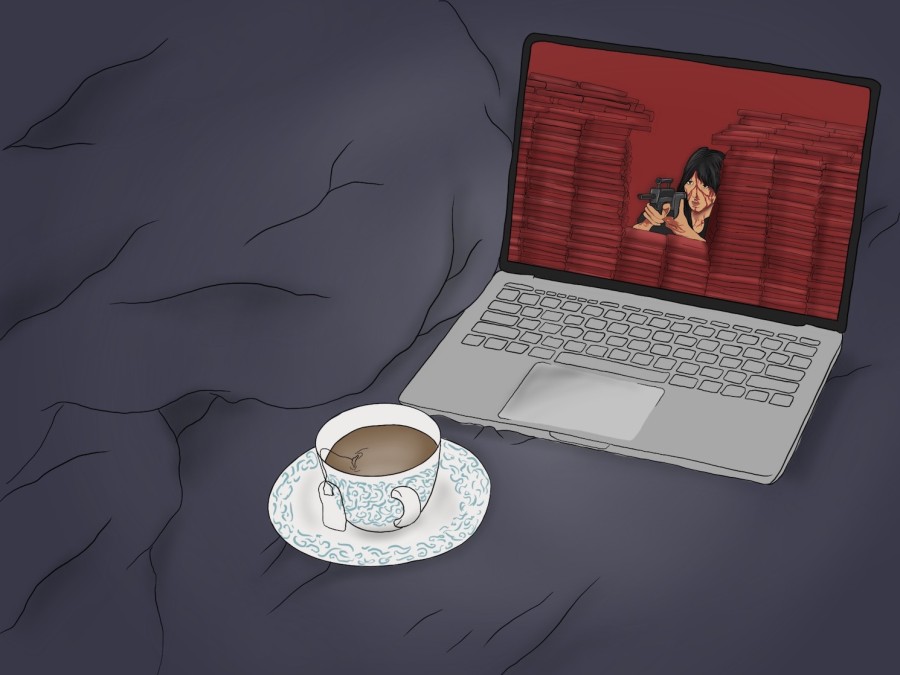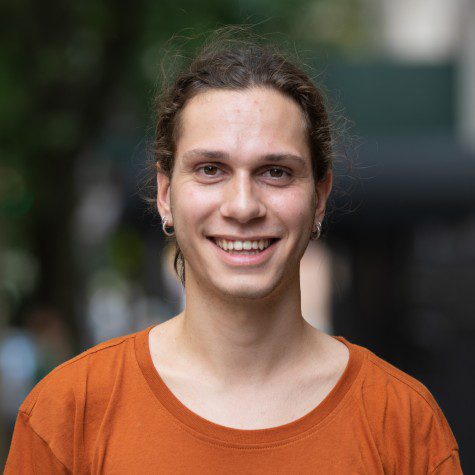Off the Radar: ‘La Chinoise’ asks ‘revolutionary or revisionist?’
“Off the Radar” is a weekly column surveying overlooked films available to students for free via NYU’s streaming partnerships. “La Chinoise” is available to stream on Kanopy.
“La Chinoise,” released in 1967, is a French dark comedy directed by Jean-Luc Godard. The film follows a group of young Maoist activists in France. (Staff Illustration by Aaliya Luthra )
April 22, 2022
There is fission. There is fusion. And there is the immortal science of Marxism-Leninism. In his satirical film “La Chinoise,” Jean-Luc Godard traces the merger and split of five communist university students who form a Maoist cell in a bourgeois flat in Paris. They study Marxian theory and contemporary political economy, plot terrorism, and commit an assasination with the aim of — something. What is their target? That is the question.
One of the five students, Guillaume (Jean-Pierre Léaud), gives us an answer. Merging Marxist-Leninist theory and the practice of revolution is like shooting at a target, he says. In other words, a fusion of theory and praxis is the target. But, such a fusion is beyond the students who are drowning in theoretical bickering, and this is the central irony of the entire satire.
“La Chinoise” is a pleasure to watch. The set is opulent, the decor is pure 1960s debonair. The set’s Mondrianesque color palette pops off the screen. The actors’ impeccably color-blocked outfits — pastel wool and acrylic sweaters, vintage denim jackets and stylish caps — also pop off. But unless you’ve thoroughly explored Karl Marx, Friedrich Engels, Vladimir Lenin, Mao Zedong and Louis Althusser — consider starting with “Critique of the Gotha Program,” “Anti-Dühring,” “What Is to Be Done,” “‘Left-Wing Communism’: An Infantile Disorder,” “The State and Revolution,” “Quotations from Chairman Mao Tse-tung,” “On Contradiction” and “For Marx” — “La Chinoise” is an incredible bore to endure.
But that’s precisely the point. According to historians Doug Enaa Greene and Shalon van Tine, Godard was inspired by anti-fascist playwright Bertolt Brecht, developer and practitioner of epic theater. By breaking the fourth wall and denying catharsis to the audience, epic theater aims to alienate objective conditions, make audience members think rather than sit back and relax, and move them to reflection and revolutionary action.
Philosopher Walter Benjamin described the task of epic theater as making contemporary conditions strange –– astonishing the audience and making them adopt a critical attitude toward the work of art and, by extension, contemporary social conditions. Benjamin incorporated the techniques of alienation and delayed gratification into his theorization of film, arguing that the politicization of art by communism — the production of films that, like epic theater, would stir the masses to reflection and revolutionary action — was the only response to the aestheticization of politics by fascism.
Godard undoubtedly read both Brecht and Benjamin, because “La Chinoise” is an impeccable example of these epic theatrical techniques, with shots of the camera recording the actors as they talk to the viewers. If “The Caucasian Chalk Circle” and “Mother Courage and Her Children” are epic theater, then “La Chinoise” is epic film.
The typical self-styled, so-called Marxist intellectual will blather about politics until blue in the face. This doesn’t make for friendly conversations, much less reader-friendly film reviews. Walking the tightrope between sincere filmic pamphlet and brutal satire, “La Chinoise” both demands such Marxian intellectualization and warns viewers about it. The masses are the target of epic theater and film and the engine of revolution, but this is precisely what the five Maoist students cloistered in their cell and engrossed in their studies forget.
“Terrorists bow to the spontaneity of the passionate indignation of intellectuals, who lack the ability or opportunity to connect the revolutionary struggle and the working-class movement into an integral whole,” Lenin writes. This is the case with the little Maoist cell in Paris. Véronique (Anne Wiazemsky) acknowledges that she is cut off from the workers (which, she adds, is why she keeps on studying Marxism-Leninism). Her parents are bankers. Guillaume’s father owns a resort. The parents of Yvonne (Juliet Berto) are farmers. In other words, our revolutionary students are bourgeois or petit bourgeois.
No matter: Lenin suggests that students are well-equipped to teach workers the crumbs of Marxism they have acquired during their studies. And yet Guillaume, Véronique, Yvonne, Henri (Michel Séméniako) and Kirilov (Lex De Bruijn) fail to do so. To be fair, every now and then they hand out copies of “Quotations from Chairman Mao Tse-tung” in the street. Mainly, though, the students study, and keep studying, and keep on studying. As a result, their ideas are formulaic, their dialogue, shallow, callow and aphoristic, like “Minima Moralia” if it were written by a 20-year-old who’s read a few pages of Marx and a few pamphlets by Lenin (although Guillaume and Véronique would surely consider Theodor Adorno a revisionist).
On a purely superficial level, then, “La Chinoise” is about the danger of forgetting that the Marxist project requires the merger of the revolutionary social democratic movement and the worker movement. Revolutionary social democratic orthodoxy without workers devolves into reactionary dogma: owning the libs, crushing the revisionists, shuttering the universities and theorizing ad infinitum.
We can see this today with the Russian invasion of Ukraine. Anti-imperialists would condemn Russia’s invasion of Ukraine and its numerous war crimes as an unprovoked and unjustifiable atrocities and also condemn NATO’s role in creating the conditions leading to the war while calling for an end to its imperialist expansion. This more principled stance has devolved in certain places into making wildly baseless and false accusations that all Ukrainians are Nazis, with some even supporting the Russian invasion outright.
On a more profound level, “La Chinoise” is an odd admixture of Marxism and existentialism, a penetrating reflection on the romanticism qua radical politics of bourgeois youth fueled by guilt and a sense of betrayal — a sense of having betrayed the revolution by being bourgeois, a sense of having been betrayed by society by being born bourgeois. The students continually remind each other to start from object reality, not their subjective desires. But it is their subject desires that drive their commitment to their cell and, by extension, the revolution. The problem is that they think they are “living the problem,” as Véronique says, when in fact they are avoiding it altogether and manufacturing a fiction instead.
The first scene outside — outside in the fresh air, outside of dank flats and dark trains — is the scene in which Véronique assassinates the Soviet minister of culture. Terrorism is thereby associated with personal liberation. The irony is that this act of terror does nothing to further the cause of revolution or working-class liberation. The students might have an intellectual base, as the philosophy professor Francis (Francis Jeanson) tells Véronique on the train on her way to assassinate the minister, but they have no class base to start a revolution. One can participate in a revolution, Francis tells Véronique, but one can’t invent one.
Godard warns us that when ideology rather than method becomes one’s guiding light, the result is desperation and terror — the kind of terror that causes Kirilov to shoot himself. After the sound and the fury, in the end, the students flee their terror: Véronique goes back to school instead of dynamiting it, Guillaume and Yvonne start an experimental theater, and Henri — expelled for failure to criticize himself — joins the revisionists’ Parti Communiste Français.
“All reactionaries are paper tigers,” according to Mao Zedong. According to “La Chinoise,” revolutionaries can be paper tigers too.
Contact Trace Miller at [email protected].

























































































































































